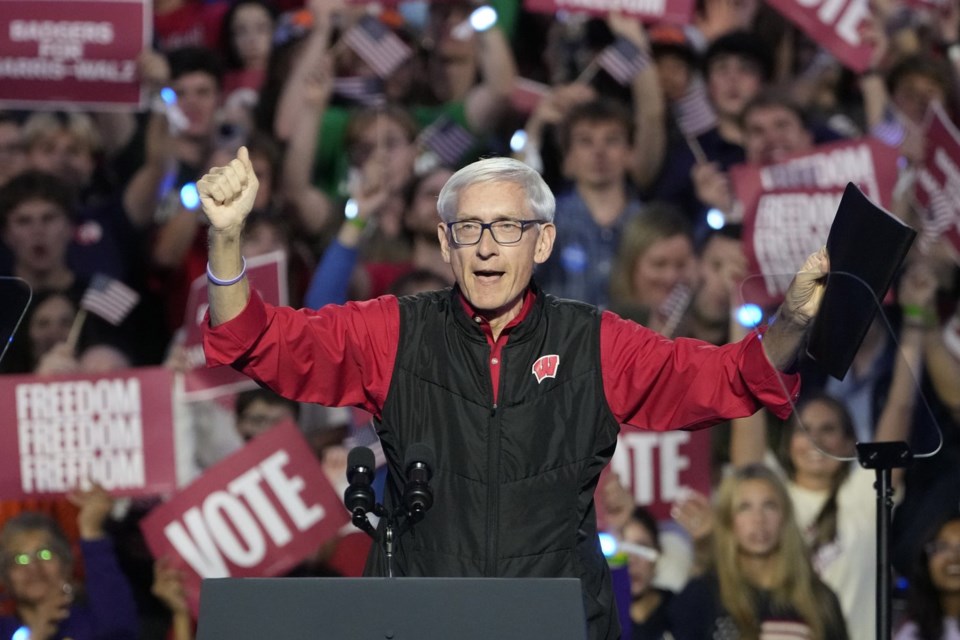MADISON, Wis. (AP) — A breakdown in negotiations over a tax cut and other spending measures in Wisconsin threatens to put the 2026 race for governor on hold, with the Democratic incumbent saying he won't announce his decision on seeking a third term in the swing state until after a budget deal is done.
Gov. Tony Evers and Republicans who control the Legislature have been meeting in private since April trying to hammer out a deal ahead of the July 1 deadline. But those talks broke down late Wednesday when Republicans walked away, both sides said.
The routine budget-writing process comes as Wisconsin is poised to be in the national political spotlight again next year with the race for governor and a fight over control of the Legislature. Evers has drawn the ire of President Donald Trump's administration and winning back the governor's office is a priority for Republicans.
New legislative district maps enacted in February 2024 are more favorable for Democrats, leading them to pick up seats in the November election. They are optimistic that they can swing at least one house of the Legislature in 2026, making it easier for a Democratic governor to enact their agenda.
The Wisconsin Supreme Court is also considering a pair of lawsuits that seek to redraw the state's congressional boundaries where Republicans hold six of eight seats. Two of those six seats are targets for national Democrats in 2026, and new maps would only increase their chances of victory as they try to take control of the House away from Republicans.
Evers is midway through his second term as governor and has repeatedly said he won't make a decision about whether to run for a third term in 2026 until after the budget is done. That has essentially frozen the field on the Democratic side, while one Republican has already launched his candidacy and others are expected to get in.
The governor's spokesperson, Sam Roecker, declined to comment on whether the stalled talks will affect the timing of Evers' decision.
There was optimism that the frosty relationship between Evers and Republican legislative leaders was thawing a bit as they met in secret for more than two months to work on the budget. But hopes of a quick deal seemed to evaporate late Wednesday with both sides announcing a stalemate after meeting for three days straight.
Evers said he supported proposals to cut income taxes for the middle class and eliminate income taxes for some retirees, but Republicans could not get behind Democratic priorities, including lowering child care costs and increasing funding for K-12 schools and the University of Wisconsin.
Evers said it was Republicans who decided to stop negotiating, even though he supported tax cuts similar to ones he has vetoed in the past.
“I was ready to make that concession in order to get important things done for Wisconsin's kids,” he said in a statement.
Assembly Republican leaders said they remained open to more talks with Evers, but in the meantime the Legislature's budget committee would continue its work "with the goal of finishing on time.” The committee resumed its work on Thursday. It has already gutted many of Evers' priorities, including legalizing marijuana.
Republican committee co-chair Sen. Howard Marklein said he was confident the Legislature would pass a budget that Evers will sign into law, noting that it has done that three times already since 2019.
Unlike in many states, the July 1 budget deadline in Wisconsin is soft because if a new plan isn’t in place by then current spending levels continue. And once the Legislature passes a budget, Evers can put his mark on it through his broad veto powers that allow him to make dramatic changes in spending.
Ending talks and potentially delaying budget enactment will only hurt Republicans and give Democrats leverage in the 2026 election on issues like education and child care funding, said Melissa Baldauff, a Democratic strategist and former deputy chief of staff to Evers.
Scott Bauer, The Associated Press


